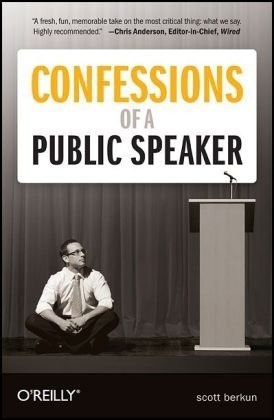Confessions of a Public Speaker
By Scott Berkun
Introduction
In Confessions of a Public Speaker, former Microsoft manager and full-time speaker Scott Berkun offers a candid and witty insider’s guide to what it’s really like to speak in public. Drawing from over a decade of professional speaking, he shares both his triumphs and train wrecks — turning painful experiences into funny, practical lessons.
Unlike textbook guides, Berkun’s book feels like a backstage pass: unfiltered, personal, and deeply useful. He believes the best speakers aren’t born — they’re made through practice, preparation, and mindset.
Everyone Gets Nervous — Even Pros
One of Berkun’s first messages is comforting: stage fright is normal. Even experienced speakers feel nervous — they’ve just learned how to manage it.
His strategies include:
- Deep breathing before going onstage
- Arriving early to get familiar with the room
- Talking with audience members beforehand to humanize the crowd
- Having backup plans for tech failures or interruptions
Confidence grows from exposure. Every speaking event is a chance to get better.
How to Bomb — and Recover
Berkun shares horror stories: empty rooms, hecklers, failing microphones, mid-talk fire alarms. His takeaway: even great speakers bomb sometimes.
What matters is how you respond:
- Stay calm and humorous
- Address the elephant in the room (“Well, that’s new.”)
- Keep going — the audience is often more forgiving than you think
- Reflect later to improve, but don’t spiral into shame
Bombing is part of the process, not a sign you shouldn’t speak.
The Audience Is on Your Side
Most audiences want the speaker to succeed. They’re not critics — they’re hoping to learn, laugh, or be inspired.
To connect with an audience:
- Make eye contact with individuals, not the room
- Use simple, clear language
- Tell stories that resonate
- Acknowledge the moment (“It’s early, you haven’t had coffee, let’s keep this light.”)
Empathy beats polish. Speak with the audience, not at them.
Preparation Is Everything
The best talks look effortless — but they’re built on rigorous preparation.
Berkun’s tips:
- Know your opening and closing lines cold
- Build around 3 key points or stories
- Don’t over-script — bullet points allow flexibility
- Rehearse out loud, ideally in front of someone
Slides should enhance, not distract. Keep them visual, sparse, and synced with your message.
The Role of Story and Humor
Stories are the heart of great talks. They humanize you, create emotional arcs, and make content memorable.
Good stories have:
- Clear conflict and resolution
- Relevant, vivid detail
- A point that ties to your theme
Humor builds rapport, relieves tension, and makes your talk more enjoyable. Self-deprecating humor works best — it shows humility without punching down.
Dealing with Distractions
Berkun addresses common disruptors:
- People leaving the room
- Phones ringing
- Late arrivals
- Host mistakes
His rule: expect the unexpected. Don’t let surprises derail your confidence. Make light of the moment and move on.
Your poise under pressure often impresses more than the content itself.
Designing Your Talk
Berkun advises against starting with PowerPoint. Instead:
- Define your goal: What should the audience feel or do?
- Outline a narrative: beginning, middle, end
- Add slides only if they help explain or reinforce your ideas
He emphasizes clarity and simplicity — one big idea per slide, no paragraphs, minimal animations.
The Myth of Natural Talent
Many people believe great speakers are born with charisma. Berkun disagrees. He believes speaking is a learned skill, improved through:
- Practice
- Feedback
- Willingness to try and fail
He encourages everyone to embrace public speaking as a craft, not a gift. Improvement is inevitable with persistence.
Lessons from the Stage
From his years of experience, Berkun offers key lessons:
- Never wing it — even improv has structure
- Have backups — printed slides, offline notes, batteries
- Arrive early — test everything, meet the tech team
- Respect the audience’s time — end on time or early
- Adapt in real time — read the room, adjust pacing or tone
Professionalism and humility matter more than flash.
Final Reflections
The book closes on an encouraging note. Speaking is vulnerable, but that’s its power. When done well, it creates connection, clarity, and change.
Berkun reminds us that the best talks aren’t the most polished — they’re the most honest and relevant.
Key Takeaways
- Stage fright is normal — and manageable.
- Story and simplicity beat jargon and slides.
- Preparation and empathy build confidence and impact.
- Recovery from mistakes is more important than perfection.
- Public speaking is a skill — anyone can improve with effort.
Confessions of a Public Speaker is funny, honest, and highly practical. Whether you’re a first-time speaker or a seasoned presenter, Scott Berkun gives you permission to be real, to screw up, and to grow — one talk at a time.

